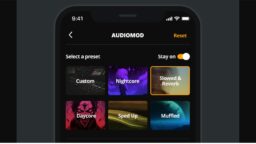‘Manipulated audio’ (i.e. tracks that have been sped up, slowed down, or otherwise tweaked, before being uploaded to the internet) is becoming a major story for the record industry in 2024.
In February, Pex published a study that analyzed 100 million audio tracks on TikTok and estimated that comfortably more than a third (38.03%) of all songs found on the platform were speed or pitch-modified in 2023.
Not only that, but Pex estimated that the share of tracks on TikTok that are modified is increasing – up from 24.55% in 2022 to 38.03% in 2023.
In a bid to compete with the popularity of such modified audio on TikTok, Spotify is reportedly working on a feature that could let its users create sped-up or slowed-down versions of songs.
That’s according to the Wall Street Journal, which, citing sources, reported today (April 11) that Spotify hopes the plan will “appeal to young users, while generating new revenue for artists”.
As per the sources cited by the WSJ, music rightsholders would be paid for streams of the user-edited versions of tracks on the platform.
It added however that “discussions about the tools are early and licensing agreements have yet to be worked out”.
The reported plans could entail letting listeners save songs that have been modified using the new tools to “virtual collections” on the platform, but they won’t be able to share those versions of songs on platforms outside of Spotify.
According to the Wall Street Journal, the “basic” elements of Spotify’s song modification features will be accessible by the platform’s $10.99-per-month Premium subscribers.
Meanwhile, added the WSJ, “more-advanced song-modification” tools could be a feature of SPOT’s rumored ‘Supremium’ tier.
That tier, as previously reported, could also offer 24-bit Lossless music at a higher monthly subscription price of $19.99 per month.
While Spotify reportedly hashes out the ability for users to legally modify tracks directly on its platform, the phenomenon of unlicensed modified tracks – whether created by users for fun and uploaded to UGC platforms like TikTok or created deliberately by ‘bad actors’ to commit streaming fraud – has become a major headache for rightsholders.
In January, Rasty Turek, the founder and CEO of Pex, told us on the MBW Podcast that there are over 1 million ‘manipulated’ tracks available on audio streaming services.
These manipulated tracks are what Pex calls ‘modified audio’ – original tracks that have been sped up, slowed down, or otherwise manipulated, and then uploaded to DSPs as entirely new recordings.
In that episode of the MBW Podcast featuring Turek, which you can listen to here, he explained the copyright implications of that estimated one million-plus modified tracks on audio streaming services like Spotify, Apple Music, and TIDAL.
Unless these million-plus tracks have legally licensed the original recording on which they’re based, they’re infringing copyright.
This doesn’t only affect music streaming. It also impacts UGC social platforms like TikTok, as highlighted by Pex’s study published in February.
“Rising in popularity, modified audio remixes often divert royalty payments away from rightsholders and into the hands of other creators,” says Pex.
“Many of these songs aren’t licensed, and as such the ownership information for them directs to the creator of the modified track, not to any of the original rightsholders.
“Without a license or proper attribution, rightsholders won’t see any credit or payment from the use of their songs.”
Just a couple of weeks ago, rapper Trefuego was ordered by the court to pay over $800,000 in damages to Sony Music for using an unlicensed sample in his TikTok hit 90mh.
It features a sped-up key violin motif from a track called Reflections by Japanese composer Toshifumi Hinata (Hinata). (Sony Music Entertainment owns copyrights in the sound recording, while Sony Music Publishing’s copyrights cover the composition).
We also reported last month, that despite Universal Music Group pulling its ‘official’ catalog from TikTok, there remained stacks of ‘manipulated’ versions of UMG recordings on the ByteDance platform, typically uploaded by users as ‘Sounds’.
As we explained in this widely-shared story, between February 1 and March 14, when that story was published, Universal Music Group had hit TikTok with over 37,000 separate copyright takedown requests to remove different ‘Sounds’ from the platform.
Those 37,000+ requests resulted in approximately 120 million videos on the ByteDance platform being muted.
The majority of those takedowns targeted sped-up, slowed-down, pitched-up, or pitched-down versions of original recordings of UMG-controlled music uploaded by TikTok users.
Because the audio of these tracks is ‘modified’, they often bypass TikTok’s copyright detection filters – the same copyright detection filters that would automatically block users from uploading videos featuring un-modified Universal tracks.
Under the condition of anonymity, a source told us that internally, UMG is calling its TikTok modified-audio-copyright-takedown effort “Project Timeout”.
Music Business Worldwide


